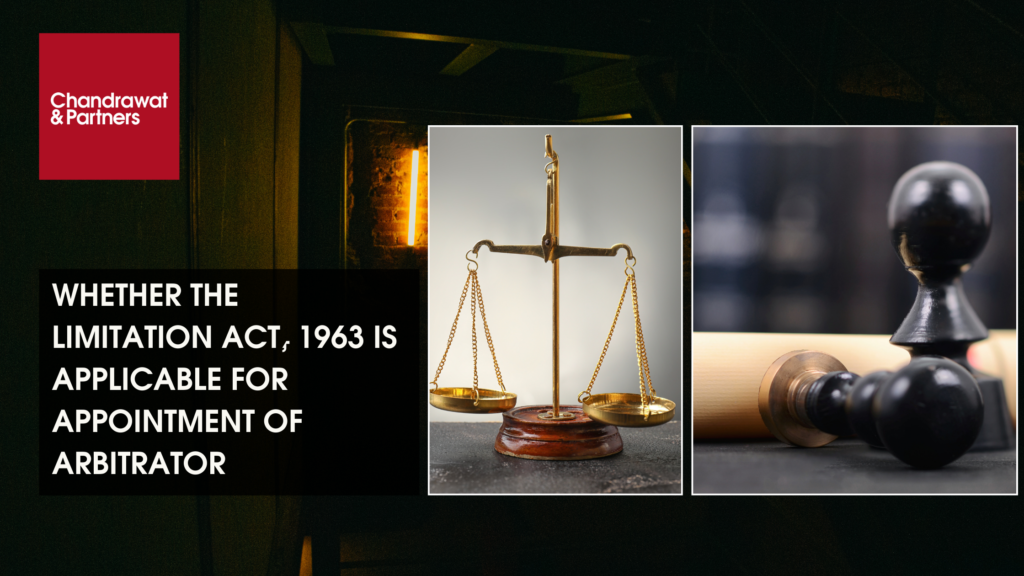Home > Recent Judgements > Whether The Limitation Act, 1963 Is Applicable For Appointment Of Arbitrator
DEC 28, 2024
BACKGROUND
In the case between M/S Arif Azim Co Ltd v. M/S Aptech Ltd, in an effort to establish India as a center for arbitration, Indian superior courts have approved the strict timelines for the several phases of arbitration procedures. Safeguards must be put in place, nevertheless, to ensure that the adjudication process does not drag on too long and deter the parties from choosing arbitration. Some of these delays may be caused by the Arbitration and Conciliation Act, 1996, important clauses lacking a set restriction time.
Section 11(6) of the Arbitration and Conciliation Act, 1996, addresses, among other things, the appointment of an arbitrator in the case that the parties are unable to do so. Although it does not provide a statute of limitations, it describes the procedures that parties may follow to choose an arbitrator in a dispute.
SECTION 11(6) OF THE ARBITRATION AND CONCILIATION ACT, 1996
Section 11(6) of the Arbitration and Conciliation Act, 1996 pertains to the procedure for the appointment of arbitrators. This provision outlines the steps and responsibilities when a party seeks the court’s assistance in appointing an arbitrator or a panel of arbitrators. Once the applicant has completed all the necessary steps and the application satisfies judicial scrutiny, the court becomes duty-bound to appoint an arbitrator and refer the matter to the arbitral tribunal.
KEY ISSUES
1.Whether Limitation Act, 1963 is applicable to an application for the appointment of an arbitrator under section 11(6) of the Arbitration and Conciliation Act? If yes, whether the present petition is barred by limitation?
2. Whether the court may refuse to make a reference under section 11 of the Arbitration and Conciliation Act, 1996 where the claims are ex-facie and hopelessly time barred?
JUDGEMENT OF THE CASE
The Court’s ruling clarifies that even though Section 11(6) of the Arbitration and Conciliation Act, 1996, does not specify a time limit for filing applications, the Limitation Act under Section 43 of the Arbitration and Conciliation Act, 1996 applies to arbitration proceedings. The Court established that Article 137 of the Limitation Act, with its provision of a three-year limitation period from the accrual of the right to apply, shall apply for all Section 11(6) applications.
This naturally raises the question of when precisely does the three-year limitation begins. The Court ascertained that it starts “once a valid notice invoking arbitration has been sent by the applicant to the other party, and there has been a failure or refusal on part of that other party in complying with the requirements mentioned in such notice.”
The Court examined whether a court is obligated to appoint an arbitrator when a petition under Section 11(6) falls within the limitation period. To address this, the Court analysis of jural relations and emphasized that the “right to apply” correlates to a court’s “duty to appoint.” The Court highlighted that a court may reject premature or non-compliant applications, but it is duty-bound to appoint an arbitrator and refer the dispute to an arbitral tribunal if the petitioner’s application meets procedural requirements and withstands limited judicial scrutiny.
OBSERVATION
When arbitrators are appointed under Section 11 of the Arbitration and Conciliation Act of 1996, the Limitation Act of 1963 applies. The Court established that Article 137 of the Limitation Act, with its provision of a three-year limitation period from the accrual of the right to apply, shall apply for all Section 11(6) applications. To reduce the possibility that their application will be denied, parties must take care to start the process within the allotted period. While allowing for judicial discretion in extraordinary circumstances, judicial precedents place a strong emphasis on following restriction rules.
For more information or queries, please email us at
enquiries@chandrawatpartners.com





